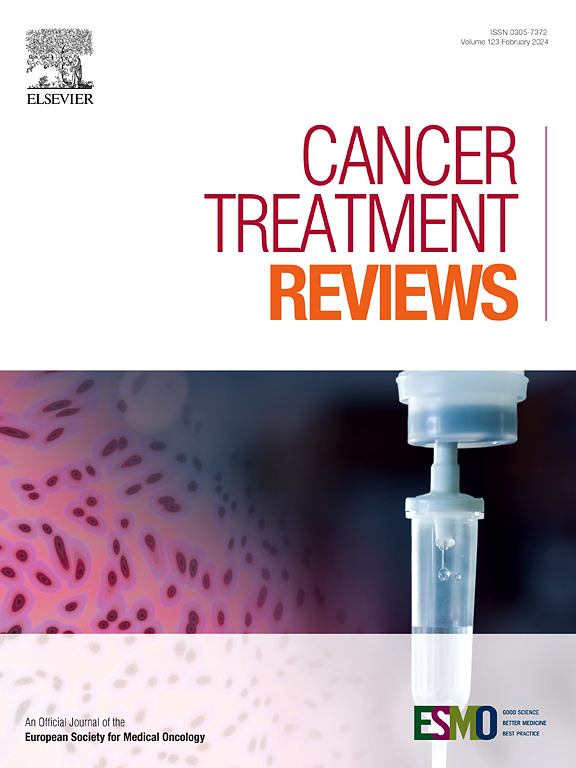CDK4/6抑制剂治疗乳腺癌患者的药物-药物相互作用和特殊注意事项:全面回顾
IF 10.5
1区 医学
Q1 ONCOLOGY
引用次数: 0
摘要
细胞周期蛋白依赖性激酶4/6抑制剂(CDK4/6i)重塑了激素受体阳性(HR +)/ her2阴性乳腺癌的辅助和转移性治疗模式。然而,它们通过细胞色素P450 (CYP3A4)途径代谢,具有临床相关药物-药物相互作用(ddi)的高风险,需要警惕的治疗策略。这篇综述全面分析了帕博西尼、利博西尼和阿贝马西尼的药代动力学、代谢和相互作用,强调了它们的DDI风险差异。在这些药物中,在一些研究中,ribociclib与QTc延长和cyp3a4介导的相互作用的高风险相关,而abemaciclib显示出相对有利的DDI特征。然而,数据仍然有限,并且主要来自间接比较或药物警戒分析。我们进一步研究了药物-药物相互作用与经常共同处方的药物的临床意义,包括质子泵抑制剂、抗真菌药物、抗凝血剂和降脂疗法。讨论了关于药物选择、治疗药物监测和剂量调整的实用建议,并关注了每个CDK4/6i的个体特征。还讨论了肾或肝损害患者的剂量调整和监测。新出现的药物基因组学数据表明,CYP3A4和ABCG2的遗传多态性影响药物暴露和毒性,这加强了对个性化治疗方法的需求。随着CDK4/6i在不同乳腺癌环境中的应用不断扩大,通过药物基因组学分析、基于生理学的药代动力学建模和人工智能指导的临床支持等精准医学策略来解决ddi问题,对于个性化治疗和优化安全性至关重要。本文章由计算机程序翻译,如有差异,请以英文原文为准。
Drug-Drug interactions and special considerations in breast cancer patients treated with CDK4/6 inhibitors: A comprehensive review
Cyclin-dependent kinase 4/6 inhibitors (CDK4/6i) have reshaped the treatment paradigm of hormone receptor positive (HR + )/HER2-negative breast cancer in both adjuvant and metastatic settings. However, their metabolism via the cytochrome P450 (CYP3A4) pathway poses a high risk of clinically relevant drug-drug interactions (DDIs), requiring vigilant therapeutic strategies. This review provides a comprehensive analysis of the pharmacokinetics, metabolism, and interaction profiles of palbociclib, ribociclib, and abemaciclib, emphasizing their differential DDI risks. Among these agents, ribociclib has been associated with a higher risk of QTc prolongation and CYP3A4-mediated interactions in some studies, whereas abemaciclib demonstrates a relatively favorable DDI profile. However, data remain limited and are largely derived from indirect comparisons or pharmacovigilance analyses. We further examine the clinical implications of drug-drug interactions with frequently co-prescribed agents, including proton pump inhibitors, antifungal medications, anticoagulants, and lipid-lowering therapies. Practical recommendations regarding drug selection, therapeutic drug monitoring, and dose adjustment are discussed with attention to the individual characteristics of each CDK4/6i. Dose modifications and monitoring in patients with renal or hepatic impairment are also discussed. Emerging pharmacogenomic data suggest that genetic polymorphisms in CYP3A4 and ABCG2 influence drug exposure and toxicity, reinforcing the need for personalized treatment approaches. As the use of CDK4/6i expands across different breast cancer settings, addressing DDIs through precision medicine strategies such as pharmacogenomic profiling, physiologically based pharmacokinetic modeling, and artificial intelligence-guided clinical support will be essential to personalize therapy and optimize safety.
求助全文
通过发布文献求助,成功后即可免费获取论文全文。
去求助
来源期刊

Cancer treatment reviews
医学-肿瘤学
CiteScore
21.40
自引率
0.80%
发文量
109
审稿时长
13 days
期刊介绍:
Cancer Treatment Reviews
Journal Overview:
International journal focused on developments in cancer treatment research
Publishes state-of-the-art, authoritative reviews to keep clinicians and researchers informed
Regular Sections in Each Issue:
Comments on Controversy
Tumor Reviews
Anti-tumor Treatments
New Drugs
Complications of Treatment
General and Supportive Care
Laboratory/Clinic Interface
Submission and Editorial System:
Online submission and editorial system for Cancer Treatment Reviews
 求助内容:
求助内容: 应助结果提醒方式:
应助结果提醒方式:


